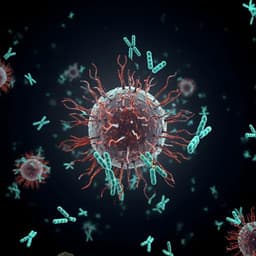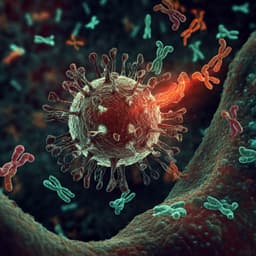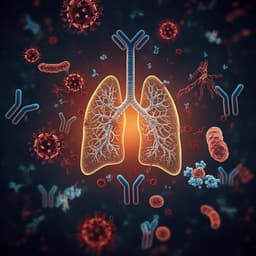
Medicine and Health
SARS-CoV-2 vaccination, booster, and infection in pregnant population enhances passive immunity in neonates
E. A. Murphy, C. Guzman-cardozo, et al.
New York City experienced early and repeated waves of SARS-CoV-2, alongside widespread rollout of mRNA and adenoviral vaccines, creating heterogeneous exposure histories in the population. Pregnancy increases the risk of severe COVID-19 outcomes, while vaccination during pregnancy has shown no increased risks to pregnancy, placenta, or fetal development and is associated with robust maternal IgG responses and passive transfer to neonates. Maternal vaccination reduces maternal infection risk and infant COVID-19 hospitalization up to six months. Booster doses restore waning antibodies and improve breadth against emerging variants. However, the added benefit to neonates of a full primary vaccination series plus booster in the context of prior maternal infection is unclear, particularly as neonatal protection is entirely dependent on passively transferred antibodies. Omicron variants (BA.1, BA.2, BA.5) have substantially eroded neutralization by vaccine-elicited antibodies, contributing to continued infection risk and vaccine hesitancy. Binding and neutralizing antibody levels correlate with protection and vaccine efficacy in adults and neutralization correlates with spike-binding antibodies. This study evaluates how vaccination dose number, booster receipt, and prior infection history in pregnant patients affect maternal anti-spike IgG levels and neutralizing activity against ancestral and omicron variants, and how these responses are transferred to neonates via the placenta.
Prior work demonstrates that vaccination during pregnancy is safe and does not increase adverse obstetric or fetal outcomes, while conferring robust maternal IgG responses and transplacental antibody transfer. Maternal vaccination has been associated with reduced maternal infections and lower risk of COVID-19–associated hospitalization among infants in the first six months of life. Boosters improve antibody titers and breadth against variants. Neutralizing antibody titers correlate with protection from symptomatic infection and with vaccine efficacy, and neutralization often correlates with spike-binding antibody levels. However, earlier studies typically analyzed vaccination or infection alone, with smaller cohorts and limited consideration of variant-specific neutralization or combined effects of vaccination status and infection history, leaving gaps on how booster doses and prior infection jointly impact maternal and neonatal immunity, particularly against omicron variants.
Design and setting: Retrospective analysis of de-identified, discarded clinical maternal peripheral blood and matched neonatal umbilical cord blood samples from deliveries at an academic medical center in New York City between April 18, 2020, and April 27, 2022. IRB approval obtained with waiver of informed consent. Participants: 4600 pregnant patients; 2999 with a history of vaccination and/or infection; 1601 with no history of vaccination or infection as controls. Median maternal age at delivery 35 years (IQR 6); median gestational age at delivery 39.3 weeks (IQR 1.5). Vaccination status: NoVx (no vaccination), PartVx (initiated but not yet 14 days post full course), FullVx (≥14 days post completion of full course: 1 dose Ad26.COV2.S or 2 doses BNT162b2/mRNA-1273), BoostVx (booster after full course; total of 2 doses for J&J, 3 doses for mRNA vaccines). Vaccinated N=2491; unvaccinated N=2109. Vaccine types: Pfizer-BioNTech n=1800; Moderna n=616; Johnson & Johnson n=64; mixed n=13. Booster vaccines: Pfizer n=481; Moderna n=186; J&J n=1. Vaccination dates ranged Dec 15, 2020–Mar 4, 2022; median gestational age at vaccine initiation 14.4 weeks (IQR 29.9). Infection history: 1011 with documented prior SARS-CoV-2 infection (516 with specific test dates, infections dated Feb 1, 2020–Apr 27, 2022); 3589 with no infection history. Antibody assays: Anti–SARS-CoV-2 spike IgG measured semi-quantitatively using the Pylon 3D fluorescence-based platform (ET HealthCare; specificity 98.8%). Anti-nucleocapsid (anti-N) antibodies measured with Roche Elecsys Anti–SARS-CoV-2 assay to confirm prior infection. IgG levels plotted as log2+1. Neutralization assays: Performed on a representative subset of 259 infected patients (based on specimen availability and documented infection dates) and their neonates (n=260). Pseudovirus neutralization with HIV-1-based NanoLuc reporter viruses pseudotyped with SARS-CoV-2 spikes (Wuhan-hu-1/B.1, Omicron BA.1, BA.5) lacking C-terminal 19 residues and with furin site inactivated (R683G). HT1080/ACE2 cells used as targets. Serial plasma dilutions incubated with virus for 1 h at 37 °C; infection read at 48 h by luciferase. NT50 determined by four-parameter nonlinear regression (GraphPad Prism), averaged from 2–3 experiments; neutralizing activity plotted as log10+1. Statistics: Comparisons across vaccination cohorts via two-sided Wilcoxon rank-sum tests. Relationships with time since last vaccine dose assessed by linear regression and mixed ANOVA. Correlations assessed by Spearman correlation and linear regression. Analyses conducted in R 4.1.0 (RStudio 1.1.463).
- Cohort composition: 3589 without infection; 1011 with prior infection. Vaccination groups without infection: NoVx n=1601, PartVx n=194, FullVx n=1311, BoostVx n=483. With infection: NoVx/Inf n=508, PartVx/Inf n=51, FullVx/Inf n=267, BoostVx/Inf n=185.
- Maternal IgG responses (no infection): Each additional vaccine dose increased IgG (NoVx vs PartVx p<2.22e-16; PartVx vs FullVx p=3.7e-9; FullVx vs BoostVx p<2.22e-16), with BoostVx highest.
- Maternal IgG responses (with infection): First vaccine dose increased IgG (NoVx/Inf vs PartVx/Inf p=1.4e-15); completing series yielded minor additional increase (PartVx/Inf vs FullVx/Inf p=0.44); booster gave further notable increase (FullVx/Inf vs BoostVx/Inf p<2.22e-16).
- Infection effect: For each vaccination status, prior infection associated with higher IgG (NoVx, PartVx, FullVx, BoostVx all p<2.22e-16 except PartVx p=1.3e-13). Fully vaccinated with infection (FullVx/Inf) had slightly lower IgG than BoostVx without infection (p=0.039). Over time, BoostVx/Inf had highest levels (linear model y=8.5+0.017x), detectable up to 50 weeks post last dose.
- Vaccine platform: Among non-infected patients, differences between Moderna and Pfizer were detected in FullVx (p=1.4e-11) and BoostVx (p=6.4e-08); no differences observed in infected cohorts (all p>0.05). Mixed ANOVA: time since last dose, vaccination status, and infection history all significantly influenced maternal IgG (all p<2.2e-16).
- Maternal neutralization (infected subset, n=259): BoostVx/Inf had highest neutralizing activity vs other cohorts for B.1 (vs FullVx/Inf p=0.013; PartVx/Inf p=0.013; NoVx/Inf p=8.4e-6). For BA.1 and BA.5, BoostVx/Inf exceeded NoVx/Inf (BA.1 p=2.9e-5; BA.5 p=0.00093); differences vs other vaccinated cohorts were smaller/non-significant. Neutralization strongly correlated with IgG: B.1 r=0.8; BA.1 r=0.74; BA.5 r=0.66 (all p<2.2e-16). No neutralization differences between Moderna and Pfizer (all p>0.05). Among the 8 highest B.1 neutralizers, all were fully vaccinated/boosted; among 35 lowest, 68.6% were unvaccinated. High BA.1/BA.5 neutralizers (n=50) mostly had infections during the BA.1 wave (48/50, 96%).
- Neonatal IgG and neutralization: Umbilical cord IgG (n=2706) strongly correlated with maternal IgG (r=0.93, p<2.2e-16). Of 56 cord samples below positive cutoff, 91% were born to partially vaccinated patients. Placental transfer ratio >0.5 in 93% (2248/2429) and >1 in 73% (1785/2429) of dyads. In neonates of infected mothers (n≈260), BoostVx/Inf neonates had highest neutralization against B.1 and BA.1 (vs FullVx/Inf: B.1 p=0.007, BA.1 p=0.045; vs PartVx/Inf: B.1 p=0.00018, BA.1 p=0.0046; vs NoVx/Inf: B.1 p=2.6e-7, BA.1 p=8.3e-7); for BA.5, BoostVx/Inf > NoVx/Inf (p=2.7e-5). Ten of 77 neonates born to unvaccinated mothers had no detectable B.1 neutralization, corresponding to maternal undetectable/low B.1 neutralization. Cord IgG correlated with cord neutralization: B.1 r=0.84; BA.1 r=0.82; BA.5 r=0.73 (all p<2.2e-16). Maternal vs neonatal neutralization correlations: B.1 r=0.86; BA.1 r=0.9; BA.5 r=0.88 (all p<2.2e-16). No differences in neonatal neutralization by vaccine platform.
The study demonstrates a clear, stepwise enhancement of maternal anti-spike IgG and neutralizing antibody activity with each additional immunologic exposure—primary vaccination, completion of series, and boosting—with prior SARS-CoV-2 infection further augmenting responses. Importantly, these augmented maternal responses translate into higher neonatal umbilical cord IgG and neutralization titers, including against omicron BA.1 and BA.5, with strong maternal–neonatal correlations. The findings address the central question of whether booster vaccination during pregnancy, particularly in the context of prior infection, benefits neonatal passive immunity: boosted mothers with prior infection yielded the highest maternal and neonatal neutralization titers. The robust correlation between total anti-S IgG and neutralization across variants suggests that readily available clinical IgG assays can serve as proxies for neutralizing capacity in this population. Lack of significant differences between mRNA vaccine platforms in neutralization for infected cohorts simplifies clinical decision-making. Collectively, these results support current recommendations for vaccination and boosting in pregnancy, even among those with previous infection, as a strategy to maximize maternal protection and confer passive protection to neonates who rely on transplacental antibodies.
In a large cohort of pregnant patients with heterogeneous vaccination and infection histories, vaccination and especially booster dosing significantly increased maternal anti-spike IgG and neutralizing activity, with prior infection further enhancing responses. These immune benefits were efficiently transferred to neonates, yielding strong maternal–neonatal correlations and higher neonatal neutralization titers, including against omicron BA.1 and BA.5. The data support vaccination and boosting during pregnancy to optimize maternal and neonatal protection. Future work should evaluate the impact of bivalent/updated boosters, define optimal timing of vaccination within gestation for maximal transfer, incorporate viral sequencing to link infection variants to responses, and dissect the sequence and timing of infection relative to vaccination on maternal and neonatal immunity.
- Infection history partially self-reported; many lacked precise infection dates or viral sequencing, limiting variant attribution and temporal analyses.
- Not all patients without a reported infection had anti-N testing; misclassification of mild/asymptomatic infections is possible.
- Inability to stratify cohorts by the order/timing of vaccination versus infection limits causal interpretation of their interaction.
- Potential confounding from earlier vaccination start among boosted patients, although analyses focused on time since last dose and demographics were balanced where possible.
- Gestational age at individual vaccination events was not analyzed as an independent predictor of transfer efficiency.
- The study period precluded inclusion of bivalent booster recipients, limiting applicability to current vaccine formulations.
Related Publications
Explore these studies to deepen your understanding of the subject.







